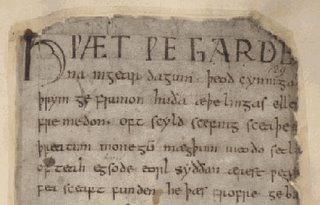Sept. 7/06 — Introduction to course; discussion of intellectual property and academic honesty
Please note: All readings are from the Broadview Anthology.
BABL = Broadview Anthology of British Literature
**With all readings from the BABL, you are expected to read the introductory material about each author and text.**
Texts listed under "Reading" are required; texts listed under "Additional reading" are optional but recommended.
Videos are subject to availability.
Always check online for any changes or updates to this schedule.
THE MIDDLE AGESSept. 12 —; Introduction to the Medieval Period;
Beowulf I
Reading: from
BABL Vol. I:
Beowulf (pp. 36–49, ll.1–836)
See the glossary (80–82), the genealogies (83), and the note on the Geatish-Swedish wars (84). Also, please read "The Medieval Period," xxvii-xli.
Video: Beowulf
and Old English literature (Films for the Humanities, 1984. 38 min.)
Sept. 14 — Beowulf II
Reading: from
BABL Vol. I:
Beowulf (pp. 49–67 ll.837–2220)
Sept. 19 — Beowulf III
Reading: from
BABL Vol. I:
Beowulf (pp. 67–80 ll.2221–3182)
Video: excerpts from filmed versions of
BeowulfSept. 21 — "Lanval"
Reading: from
BABL Vol. I: Marie de France (158–159), "Lanval" (166–181)
"In Context" (301–304), "The Medieval Period" (xli–lix)
Additional Reading: from
BABL Vol. I: from "Love and Marriage in Medieval Britain" (305–323)
Video: Illuminated lives: a brief history of women in the Middle Ages (NFB, 1989. 6 min.)
Sept. 26 — Sir Gawain and the Green Knight I
Reading: from
BABL Vol. I:
Sir Gawain and the Green Knight (pp. 235–265 Pts. 1 & 2)
"In Context" (301–304), "The Medieval Period" (xli–lix)
Additional Reading: from
BABL Vol. I: from "The Crises of the Fourteenth Century" (200–212) and "Love and Marriage in Medieval Britain" (305–323)
Sept. 28 — Sir Gawain and the Green Knight II
Reading: from
BABL Vol. I:
Sir Gawain (pp. 265–300 Pts. 3 & 4)
Oct. 3 — Everyman I
Reading: from
BABL Vol. I:
Everyman (pp. 664–677)
Video: Everyman (Insight Media, 1991. 50 min.)
Due date: Assignment #1 due
Oct. 5 — Everyman II
Additional Reading: from "Religious and Spiritual Life" (547–584)
THE SIXTEENTH CENTURY / THE EARLY SEVENTEENTH CENTURYOct. 10 — Introduction to the Renaissance and early Seventeenth Century; Sonnets I: love sonnets
Reading: from
BABL Vol. II: Francesco Petrarch,
Rime Sparse 190 (124); Edmund Spenser (139–40),
Amoretti 67 (246); Sir Philip Sidney (254–255),
Astrophil and Stella 52 (258)
"The Elizabethan Sonnet and Lyric" (122)
Additional Reading: from
BABL Vol. II: "The Renaissance and the Early Seventeenth Century" (xxxv–lxxxvi), particularly "Poetry" (lxix–lxxx)
Oct. 12 — Sonnets II: more love sonnets
Reading: from
BABL Vol. II: William Shakespeare (450–455), Sonnets 18, 94, and 130 (457, 462, 465)
Additional Reading: from
BABL Vol. II: "The Renaissance and the Early Seventeenth Century" (xxxv–lxxxvi), particularly "Poetry" (lxix–lxxx)
Oct. 17 — Doctor Faustus I
Reading: from
BABL Vol. II: Christopher Marlowe (402–403),
The Tragical History of Doctor Faustus (416–445)
"In Context" (445–449)
Additional Reading: from
BABL Vol. II: "The Renaissance and the Early Seventeenth Century" (xxxv–lxxxvi), particularly "The Drama" (lxxx–lxxxvi)
Oct. 19 — Doctor Faustus II
Additional Reading: from
BABL Vol. II: from "Religion and Devotional Life" (87–106); "The Supernatural and the Miraculous" (311–314)
Oct. 24 — Sonnets III: sonnets revised
Reading: from
BABL Vol. II: Mary Wroth (744–745),
Pamphilia to Amphilanthus 35 (747); Katherine Philips (785–786), "A Married State" (786–787); John Donne (649–650), Holy Sonnet 18 (673); John Milton (819–821), Sonnet 18: "On the Late Massacre in Piedmont" (831)
"In Context" (748–749)
Oct. 26 — Debates about women
Reading: from
BABL Vol. II: "'Unconstant Women,' 'Excellent Women': A Seventeenth-Century Debate" (556–568); Aemilia Lanyer (327), "Eve's Apology in Defense of Women" (329–330)
Oct. 31 — Metaphysical poets I
Reading: from
BABL Vol. II: Christopher Marlowe (402–403), "The Passionate Shepherd to His Love" (415); John Donne (649–650), "The Bait" (657)
Due date: Assignment #2 due
Nov. 2 — Metaphysical poets II
Reading: from
BABL Vol. II: John Donne (649–650), "The Flea" (656); Andrew Marvell (772–773), "To His Coy Mistress" (777–778)
THE RESTORATION AND THE EIGHTEENTH CENTURY Nov. 7 — Introduction to the Long Eighteenth Century; Restoration Bawdy
Reading: from
BABL Vol. III: Aphra Behn (139–140), "The Disappointment" (140–142); John Wilmot (231–232), "The Imperfect Enjoyment" (240–241)
Additional Reading: from
BABL Vol. III: from "Introduction to the Restoration and the Eighteenth Century" (xxix–lxiv), in particular "Poetry" (xlix–liii)
Video: excerpts from
The Libertine (Dir. Laurence Dunmore, 2004)
Nov. 9 — Reading day: no class
Nov. 14 — Amatory Fiction
Reading: from
BABL Vol. III: Eliza Haywood (513–514), "Fantomina" (514–529)
"In Context" (529–532)
Nov. 16 — Popular Ballads
Reading: from
BABL Vol. III: "Popular Ballads" (610); "Tam Lin" (614–617); "Mary Hamilton" (620-621)
Nov. 21 — Gulliver's Travels I
Reading: from
BABL Vol. III: Jonathan Swift (302–304),
Gulliver's Travels Parts I & II (317–378)
Video: Gulliver's Travels (Films for the Humanities & Sciences, 1996. 53 min.)
Nov. 23 — Gulliver's Travels II
Reading: from
BABL Vol. III:
Gulliver's Travels Part IV (378–413)
"In Context" (413–417)
Nov. 28 — Periodical Essays
Reading: from
BABL Vol. III: Samuel Johnson (558–560),
The Rambler No. 4 [On Fiction] (565–568);
The Rambler No. 155 [On Becoming Acquainted with Our Real Characters] (573–575);
The Idler No. 49 [Will Marvel] (580–581);
The Idler No. 81 [On Native Americans] (581–582)
"Print Culture" (xlv–xlix)
Due date: Assignment #3 due
Nov. 30 — Battle of the Sexes
Reading: from
BABL Vol. III: Jonathan Swift (302–304), "The Lady's Dressing Room" (307–309); Lady Mary Wortley Montagu (485–486), "The Reasons That Induced Dr. Swift to Write a Poem Called the Lady's Dressing Room" (488–489)
